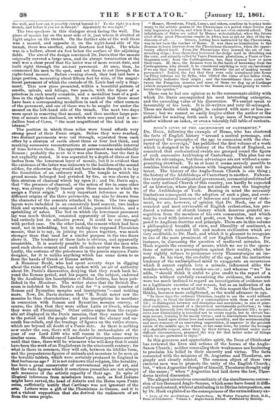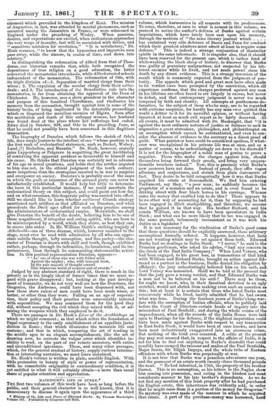HOOK'S LIVES OF THE ARCHBISHOPS OF CANTERBURY. * Da. Hal); following
the example of Hume, who has clustered the facts of English history " around a central personage, and pourtrayed the principles of the age in connexion with the cha- racter of the sovereign," has published the first volume of a work which is designed to be a history of the Church of England, so conceived that ecclesiastical events are grouped round the figure of each successive Archbishop of Canterbury. This plan has no doubt its advantages, but these advantages are not without a com- pensating drawback. To ua at least it seems scarcely possible to combine historical completeness with biographical unity and in- terest. The history of the Anglo-Saxon Church is one thing ; the history of the Archbishops of Canterbury is another. Exhaus- tive treatment o f the subjects of government, ceremonial and ritual of the early national Church of this country, can hardly be expected. of an historian, whose plan does not include even the biography of the Archbishops of York. Bearing in mind the necessary limitations consequent on the adoption of such a plan, and over- looking occasional looseness of inference and inaccuracy of state- ment, we are, however, of opinion that Dr. Hook, one of the soundest and most serviceable of English ecclesiastics, has pro- duced a volume of church history which deserves grateful re- cognition from the members of his own communion, and which may be read with interest and profit, even by those who are op- posed to Anglican doctrine and principle, There are in.this volume a philosophical breadth of view, and liberality of sentiment, a sympathy with national life and modern civilization which are very creditable to Dr. Hook, and which it is pleasant to recognize in one of the more prominent of our English Churchmen. For instance, in discussing the question of mediaeval miracles, Dr. Hook regards the economy of means, which we see in the opera- tions of nature as a presumption against their reality, while he very rightly refuses to pronounce every Thaumaturgus an im- postor. In his view, the credulity of the age, and the instinctive tendency of the undisciplined mind to exaggerate an occurrence which it cannot explain into a miracle, influenced alike the wonder-worker, and the wonder-see-er ; and whereas " we " he adds, " should think it sinful to give credit to the report of ts miracle without carefully examining the evidence, the ancients were too much inclined to regard an investigation of evidence not as a legitimate exercise of our reason, but as an indication of an infidel temper, or a want of faith." In this respect the Church, he thinks, becomes more enlightened, as the world advancer in age.
" In these days the ordinary Christian, taught to use the world without abusing it ; to blend the duties of a contemplative with those of an active life ; to distinguish between self-discipline and asceticism; to aim at prase, tical usefulness, instead of a theoretical unattainable perfection; to take lessons in heavenly love through the endearments of domestic life; to per. ceive how Christianity is intended not to create angels, but to elevate hu. man nature, training it for manly virtue ; and to discriminate between true religion, based upon divine love and sound morality, and the sentimentality and mere romance of an enervating superstition, is superior to the greatest saints of the middle age, to whom, at the same time, we tender the homage of a charitable respect, since they by their 'virtues, exhibited under more difficult circumstances, prepared the way for that better order of things. which we are permitted to enjoy."
In this generous and appreciative spirit, the Dean of Chichester has reviewed the lives and actions of the heroes of the Anglo- Saxon Church ; neither concealing their weaknesses nor hesitating to proclaim his belief in their sincerity and virtue. The facts connected with the missions of St. Augustine and Theodorus, are simply and clearly related, The common object of these two . eminent men was to promote the unity of the English Church ; but, " when Augustine thought of himself, Theodorus thought only of the cause ; " when " Augustine had laid down the law, Theo- dorus invited discussion."
The alleged miraculous concomitants of the simultaneous conver- sion of ten thousand Anglo-Saxons, which some have found it difile cult to understand, without attributing it to Divine interposition, are by Dr. Hook explained as the consequences of the extraordinary ex-
• Lives of the Archbishops of Canterbury. By Walter Farquhar Book, D.D., Dean of Chichester. Volume I. Anglo-Saxon Period. Published by Bentley.
citement which prevailed in the kingdom of Kent. The mission of Augustine, in fact, was attended by mental phenomena, such as occurred among the Jansenists in France, or were witnessed in England under the preaching of Wesley. When passions, desires, and expectations are excited, when enthusiasm approaches the very verge of insanity, fact will be associated with fiction, and " sensations mistaken for revelation." " It is satisfactory," Dr. Hook resumes, " to know that the hypocrites and impostors soon pass away, while the sincere, in course of time, cool down into sobriety.' In distinguishing the reformation of Alfred from that of Theo- dorm, our historian remarks that, while both recognized the dependence of true religion on a good education, the latter converted the monasteries into schools, while Alfred erected schools independent of the monasteries. The reformation of Odo, with its triple division of—I. Separation of married clergy from their wives ; 2. The expulsion of the secular clergy from their cathe- drals ; and 3. The introduction of the Benedictine rule into the monasteries, is far from obtaining the approval of the Dean of Chichester. He, however, sees a stern grandeur in the character and purpose of this fanatical Churchman, and vindicates his memory from the accusation, brought against him in some of the history books, of being implicated in the detestable proceedings which so disgraced the merciless enemies of Elgiva. Soon after the mutilation and death of this unhappy woman, her husband was found dead at the place where her sufferings had ended. Edwy died in October, 958, and Odo in the preceding June so that he could not possibly have been concerned in this flagitious transaction.
The biography. of Dunstan which follows the sketch of Odo's life, does ample justice to the intellect of one "whose position is in the first rank of ecclesiastical statesmen, such as Becket, Wolsey, Land, (?) Richelieu, and Mazarin." Dr. Hook, however, scarcely joins Lappenberg or Palgrave in acquitting the great Archbishop of contriving the apparent accident so favourable to himself and his cause. He thinks that Dunstan was certainly not in advance of his age in moral questions, and holds that the artifice imputed to him was not, in the ethical judgment of the tenth century, more iniquitous than the stratagems resorted to in war to surprise and overpower an enemy. Dunstan's is probably one of the cases in which the guilt or innocence of the accused party can never be satisfactorily established. It would help but little to determine the issue in this particular instance, if we could ascertain the ecclesiastical theory on this subject, and could point out how far, and on what occasions, this desperate policy was carried into effect. Still we should like to learn whether mediaeval Church strategy sanctioned such artifices as that affiliated on Dunstan, and what precedents the Dark ages afford for such sharp practice among the administrators of ecclesiastical empire. Meanwhile, we shall give Dunstan the benefit of the doubt, believing him to be one of those magnificent, if irregular and erring spirits, who are born to be misinterpreted by a world, which they strive, as best they can, to coerce into order. In Mr. William Smith's striking tragedy of Atheltoold—one of three dramas, which, however unsuited to the stage, must ever be read with admiration by all who can appre- ciate subtile thought, lofty conception, and fine poetry—the cha- racter of Dunstan is drawn with skill and truth, though exhibited rather, perhaps, through its infirmities, its fanaticism, and its im- periousness, than through its commanding statesmanlike activi- ties. In this poetical representation Dunstan, appears- " ' As' one of those who war with folded arms
Against the mighty; who, with tranquil brow, In the pale majesty of thought control This boisterous world of sceptres and of swords."
Judged by any abstract standard of right, there is much in the priestly as in the kingly ideal of former times that we must re- gard with grave disapproval ; but, looking at the past develop- ment of humanity, we do not very well see how the Dunstans, the Gregories, the Ambroses, could have been dispensed with, nor how these stern rulers of men could have been made wiser, or better, or other than they were. Falling on an age of supersti- tion, their policy and their practice were unavoidably infected with superstition. We may commend them for the good they did, without accepting the evil which they mixed with it, or ad- miring the weapons which they employed to do it. There are passages in Dr. Hook's Lives of the Archbishops on which we might comment ; as that which refers the foundation of Papal supremacy to the early establishment of an appellate juris- diction in Rome ; that which illustrates the monastic life and costume ; and that in which, comparing the art of reading in the middle ages to an elegant accomplishment, like the art of drawing now, he corrects the vulgar ,error which identifies in- ability to read, on the part of our remote ancestors, with entire and unconditional ignorance. These, and many other passages, which, for the general student of history, supply curious informa- tion or interesting narrative, we must leave unnoticed.
Dr. Hook's volume is written in plain, sensible English. With little pretension to beauty of style or power of representation; with no remarkable originality or extraordinary erudition, it is yet entitled to what it will certainly obtain—a more than usual share of popular attention and approbation.



























 Previous page
Previous page